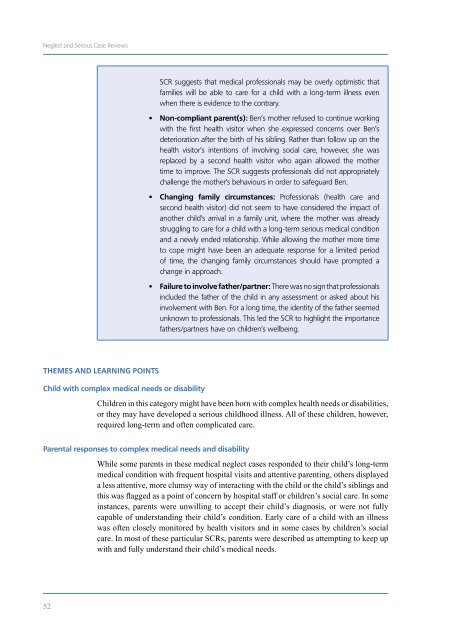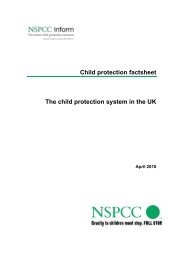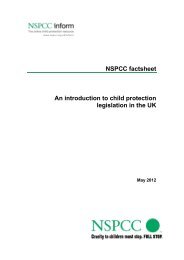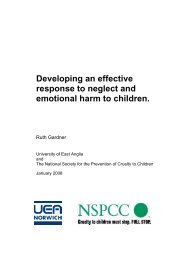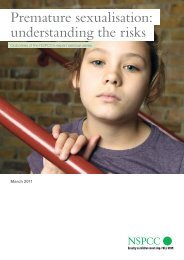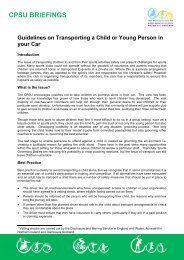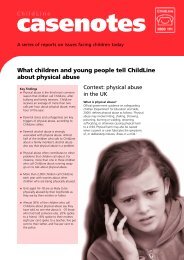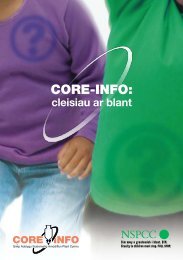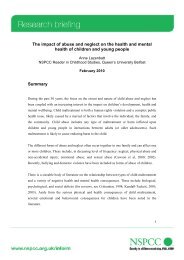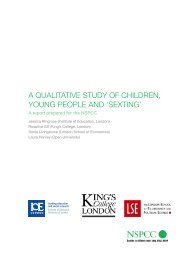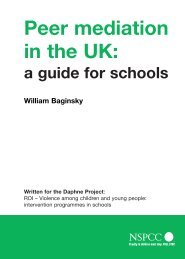Neglect and serious case reviews (PDF, 735KB) - nspcc
Neglect and serious case reviews (PDF, 735KB) - nspcc
Neglect and serious case reviews (PDF, 735KB) - nspcc
You also want an ePaper? Increase the reach of your titles
YUMPU automatically turns print PDFs into web optimized ePapers that Google loves.
<strong>Neglect</strong> <strong>and</strong> Serious Case Reviews<br />
themeS aNd learNiNg poiNtS<br />
child with complex medical needs or disability<br />
SCR suggests that medical professionals may be overly optimistic that<br />
families will be able to care for a child with a long-term illness even<br />
when there is evidence to the contrary.<br />
• Non-compliant parent(s): Ben’s mother refused to continue working<br />
with the first health visitor when she expressed concerns over Ben’s<br />
deterioration after the birth of his sibling. Rather than follow up on the<br />
health visitor’s intentions of involving social care, however, she was<br />
replaced by a second health visitor who again allowed the mother<br />
time to improve. The SCR suggests professionals did not appropriately<br />
challenge the mother’s behaviours in order to safeguard Ben.<br />
• changing family circumstances: Professionals (health care <strong>and</strong><br />
second health visitor) did not seem to have considered the impact of<br />
another child’s arrival in a family unit, where the mother was already<br />
struggling to care for a child with a long-term <strong>serious</strong> medical condition<br />
<strong>and</strong> a newly ended relationship. While allowing the mother more time<br />
to cope might have been an adequate response for a limited period<br />
of time, the changing family circumstances should have prompted a<br />
change in approach.<br />
• failure to involve father/partner: There was no sign that professionals<br />
included the father of the child in any assessment or asked about his<br />
involvement with Ben. For a long time, the identity of the father seemed<br />
unknown to professionals. This led the SCR to highlight the importance<br />
fathers/partners have on children’s wellbeing.<br />
Children in this category might have been born with complex health needs or disabilities,<br />
or they may have developed a <strong>serious</strong> childhood illness. All of these children, however,<br />
required long-term <strong>and</strong> often complicated care.<br />
parental responses to complex medical needs <strong>and</strong> disability<br />
52<br />
While some parents in these medical neglect <strong>case</strong>s responded to their child’s long-term<br />
medical condition with frequent hospital visits <strong>and</strong> attentive parenting, others displayed<br />
a less attentive, more clumsy way of interacting with the child or the child’s siblings <strong>and</strong><br />
this was flagged as a point of concern by hospital staff or children’s social care. In some<br />
instances, parents were unwilling to accept their child’s diagnosis, or were not fully<br />
capable of underst<strong>and</strong>ing their child’s condition. Early care of a child with an illness<br />
was often closely monitored by health visitors <strong>and</strong> in some <strong>case</strong>s by children’s social<br />
care. In most of these particular SCRs, parents were described as attempting to keep up<br />
with <strong>and</strong> fully underst<strong>and</strong> their child’s medical needs.


